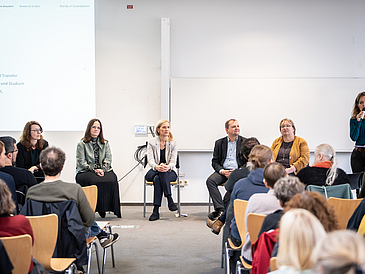The event, which was organized in cooperation with Worlds of Contradiction (WOC) and the Center for Performance Studies, focused on academic freedom in the context of the tension between freedom of research and social, political, and ethical framework conditions. University President Jutta Günther began by saying that the topic was multifaceted and that academic freedom was more important than ever: “It is the foundation on which we all stand and I can see that it is currently being discussed a lot. We have something we need to defend. Some things are not in good shape."
Experts from various faculties at the University of Bremen shed light on the topics in four panels:
The first focused on academic freedom in the area of tension between fundamental protection and (global) threats. Academic freedom is cultivated in Germany and is generally a given, as one participant summarized. However, it should be noted that academic freedom should not be equated with freedom of opinion. Academics need good evidence to counter a climate of hostility towards science. Geopolitical developments also pose a threat to academic freedom, leading to major problems in cooperation with universities in China and Russia, for example. Another threat to academic freedom, according to many participants, is the underfunding of universities. The conclusion was that academic freedom is linked to funding.
In the second session, which focused on early career academics' views on academic freedom, there was agreement that there is fundamental freedom in the area of research. The panelists gave interesting insights into their everyday university life, as they often find themselves in a field of tension between interest in a controversial topic on the one hand and public excitement about it on the other when choosing research topics.
What does academic freedom mean in an interdisciplinary context? This was another question posed at the University in Talk event. There was a consensus that it is important to take the perspective of the Global South into account. A view that is not Eurocentric, but transdisciplinary and international, opens up significantly more new perspectives.
The extent to which artificial intelligence is an opportunity or a threat to academic freedom was the topic of the fourth round of talks. One of the questions raised here was who uses AI for what and who controls the resources. There was agreement that it was important to think beyond the service character of AI and to critically examine it.
This was followed by discussions in the form of fishbowls with the members of the University Executive Board. The conclusion of the participants: Even if the issues at stake are not easy, the debates held in such appreciative formats are always enriching. After all, maintaining a lively culture of discourse at the University of Bremen involves exchanging ideas.
The topic of academic freedom is also the focus of the 36th Bremen University Talks, which will kick off at 6 p.m. on Thursday, November 21, 2024 at the Kunsthalle Bremen art gallery. After an introduction on the topic of “Academic Freedom Today” by Prof. Dr. Michi Knecht, Prof. Dr. Ingo H. Warnke, and PD Dr. Ehler Voss (all from Worlds of Contradiction, University of Bremen), there will be a panel discussion on the topic of “Universities in the Crossfire of Geopolitical Threats” with Prof. Dr. Shalini Randeria (Central European University, Vienna) and Dr. Elisabeth von Thadden (DIE ZEIT, Hamburg).

